 In 1803, then President Jefferson bought 828,000 square miles of prime North American real estate from France’s garage sale for the bargain bin price of about 3 cents an acre. While that price is a tad higher when adjusted for inflation, you really can’t find much fault in his haggling skills.
In 1803, then President Jefferson bought 828,000 square miles of prime North American real estate from France’s garage sale for the bargain bin price of about 3 cents an acre. While that price is a tad higher when adjusted for inflation, you really can’t find much fault in his haggling skills.
Regardless, in the days before google had spied on every square inch of our country with satellites and camera cars, someone had to map out this newly acquired land. To do that, it required taking a trip through the wilderness with some good old ink and parchment.
Enter Discoveries: The Journals of Lewis & Clark. Eurogame fans might remember a previous game about Lewis and Clark that came out in 2013. While it apparently received some mixed reviews, I enjoyed the game quite a bit. Not to be content with one foray into the Louisiana Purchase, game designers Cédrick Chaboussit and Vincent Dutrait bring us a dice-based version of Lewis and Clark. Did they succeed in making a unique new dice game for us to enjoy? Lets dive in and find out!
Discoveries is a dice rolling and worker placement game for 2-4 players that takes about 60 minutes to play. Discoveries plays well with any number of players.
Game Overview:
The main action in Discoveries has players rolling dice and using the results to take actions on their player board. Many of the actions will be in the form of traveling through expeditions into the wilderness, both via rivers and mountains.
As players complete expedition routes, they will place them in their journal, earning victory points. Along the way, players also may seek help from the American Indian tribes, granting them special abilities and more efficient actions. Once the last travel route has been journaled, points are calculated and the player with the most is the winner.
Game Components:

If there is a publisher that knows how to craft a game, it’s certainly Asmodee. Everything in Discoveries is excellently produced from the custom dice to the fantastic, thematic illustrations. In general I am a really big fan of the artwork in Discoveries. I found it to be unique, well drawn, and highly thematic fitting the time period of the game.
Each player starts the game with a player board that houses their dice and also the basic action spaces that they can take during the game. The other major component (besides the dice of course), is the dual sided game cards. One side of each card has a route that needs to be journaled, while the reverse side has an American Indian tribe that can be acquired to grant the player a special ability.
Finally, the game rulebook is really well designed. I found it to be easy to learn the game from and also very useful as a reference. It contains explanations of all the Indian cards and also has many historical tidbits, which I found to be a nice touch.
How to Play:
To start the game, each player gets a player board, a set of colored dice, and a player aid. The discoveries/tribe cards are shuffled and three tribe and discovery cards are dealt out into their appropriate areas.
Starting with a start player, each player will take turns in a clockwise manner. On a player’s turn, they can do one of two things: Place dice or Retrieve Dice.
When a player places dice, they can use any amount of dice, as long as they are all showing the same face. The default actions a player can take are:
-
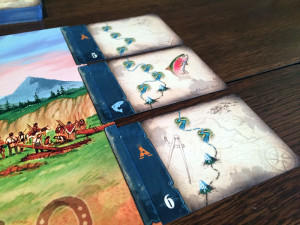
The goal is to complete these cards to earn you victory points. Take a tribe card: These cards require a player to spend either one or two Indian heads to acquire. Once in their play area, they grant the player special abilities.
- Change dice faces: Spend a die to change up to two dice to another face.
- Swap out your current discovery card – Trade your current discovery card for a new one. A player can only work on one route at time.
- Travel through a River or Mountain – These actions will usually require a player to spend more than one turn to complete since they require different dice faces. Once activated, a player can complete their current discovery card (assuming they have the required amount of travel points).
A discovery card must be fully traveled in one turn to be completed. Once accomplished, cards are placed under a players journal and a new one is taken from the supply.
After a players turn, all dice used are either placed on the game board (on one of two sides) or re-rolled and returned to a players active dice area. Dice placed on the main board are placed on a specific half of the board, depending on which face of the die was used that turn.
Retrieve Dice: The main board in the game is divided into two halves. When it’s time to retrieve dice, you have one of two options:
• Take all the dice on one half of the main board (including your opponents)
• Take all of your dice back.
Once dice are retrieved, they are immediately rolled and ready to use on your next turn.
Rounds progress in this manner until a player completes a discovery card and cannot replace it. In that case, each other player gets one more turn and the game is over. The player with the most points is the winner. Victory points are earned from discovery cards, set collection (there are icons on some of the discovery cards), or having a majority of cards with tribe icons.

Game Experience:
When it comes to dice rolling games, gamers aren’t really suffering from a lack of options. So new entries to the genre really need to step up their game to be noticed and have any kind of staying power. One of the things I look for in a new dice game is if it’s different enough from other games I already own.
And on that front, I’d say Discoveries succeeds. The designers of Discoveries created an interesting dice reclamation mechanic that I’ve not seen elsewhere. After using a die, they are either rerolled or placed on one half of the main board. When it’s time to retrieve dice, players must make a decision of where to take the dice from. The obvious choice is to take the dice from the side of the main board with the most dice on it. However, players have to also think about what actual dice are in that pile. (FYI, in addition to player dice, there are also neutral dice).

This is because a player can have their dice stolen from them at any given moment if another player decides to reclaim their dice. This is most notable when players are using spots that require multiple turns to complete. If I use the red player’s dice on step one of my river action, and then he decides to collect all his dice back, I’ve basically wasted a turn. Overall this was a brilliant mechanic that adds a nice level of depth to the game.
Moving on, once you get into the heart of the game, Discoveries is really an engine building and optimization game. This comes in the form of the tribe cards, where players can not only claim cards that will grant them more efficient travel modes, but also special abilities. The player that can maximize the use out of these cards will set themselves up for victory.
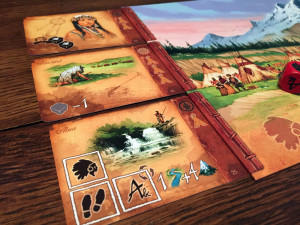
The cards themselves are somewhat of a double-edged sword in the game. Since cards have a dual use, you really never know what cards will be making their way into the game. This has the benefit of really giving the game a lot of replay value as no two games will never be the same.
On the other hand, it can be really hard to plan strategies as you sometimes have no idea what cards will appear. This is especially true when it comes to the set collection. There are 4 unique symbols that players want to grab, and it can be a very real possibility for a symbol to only appear once in the game!
Another thing Discoveries has going for it is the game flow. Since you only get one action per turn, downtime in the game is incredibly minimal. As players have all their dice rolled out in advance, they have plenty of time to figure out what they want to do on their turn. Usually it’s not uncommon for players to have their turns planned out for 2-3 rounds. This makes it really easy to stay focused during the game and allow the time to flow by quickly.
On that note though, I should say that Discoveries can sometimes feel like it’s running a bit long. While I enjoy playing the game, after a while, it can start to feel like you are repeating the same actions over and over. This is especially true once you’ve got your engine optimized and know the route you need to go to complete discovery cards quickly. I feel like if they shaved off about 10-15 minutes of the play time, it would really hit that sweet spot of play time.
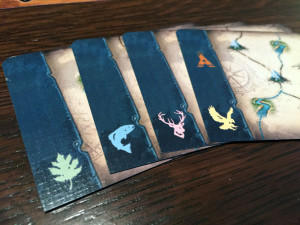
Finally, lets talk about players scaling and interaction. Overall, the player interaction is somewhat minimal. Other than the aforementioned dice stealing, you really won’t be interacting with your fellow players all that much. I wish they would have come up with a few tribe cards that would have you interacting with your fellow players.
When it comes to player scaling, Discoveries runs the gamut really well. It works just as great with two players as it does with four. I will say that I probably enjoy it a bit more at the higher counts, mostly because the main board can fill up with more dice. It does’t affect the game play much, but it can be a lot of fun to just sling a large pile of dice around.
Final Thoughts:
When a designer attempts to remake a successful game into a dice version, you really never know what you are going to get. Sometimes you get Catan: The Dice Game (meh), but other times you are gifted with excellent games like Roll for the Galaxy. I’d say that Discoveries definitely falls in the higher end of the spectrum. It’s easily the best reimplementation of a game in dice form since Roll for the Galaxy. The game flow is fantastic, the downtime minimal, and I loved the unique way that the dice are handled in the game.
I know there are no shortage of dice rolling games for players to choose from, but I think Asmodee put together a solid dice game that has already made its way to our gaming table a number of times. From the easy to learn rules, to the fantastic components and artwork, most of my complaints with Discoveries are very minimal. Check this one out today.
If you’d like to pick up a copy of Discoveries for yourself, it’s about $30.
Final Score: 4.5 Stars – A great reimplementation of the Lewis and Clark board game. Only some minor gripes in this overall stellar game.
 Hits:
Hits:
• Great artwork and components
• Unique dice mechanics
• Scales perfectly from 2 to 4
• Fun engine optimization
Misses:
• Can sometimes feel a bit long
• Could use more player interaction





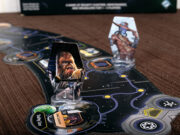


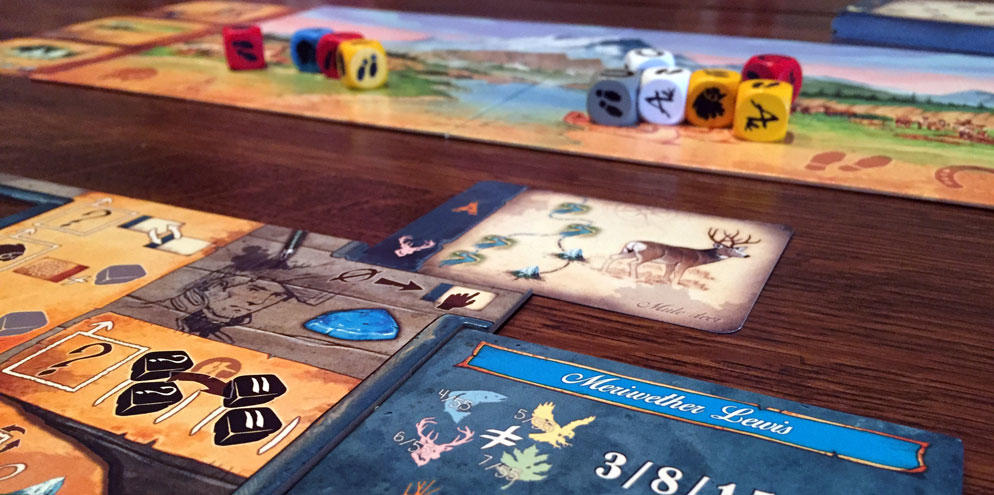

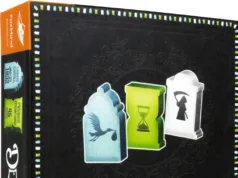
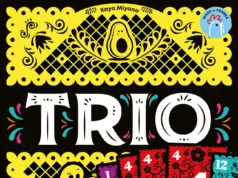












Ludonaute is the publisher, Asmodee is the distributor.
True. I just went with the name most english readers would know. 🙂
I LOVE Lewis and Clark and looking forward to picking this one up too!
if choosing a Lewis and clark themed game, which do you think holds a better ground and hit the table more often? the original L & C or this one?
It seems that the former is a much more complete, deep game, yet i’ve read mixed reviews about the time frame and how long it can take with more than 3 players. What is your feedback on this?
Both are great games. However discoveries is much easier to get to the table because it plays quicker and the rules are much easier. However the original game is much deeper and offerers a more indepth play experience. It really comes down to what you are looking for. A easier to play dice game or a more indepth euro game.
I agree with the pros and cons. Related to the fact that if it`s long or not, if someone has concerns with the playtime it can be easily modified by reducing the cards in play. However since this game is fun and easy to follow I didn`t have any issues with this part. One of the best dice games on the market in my opinion. Great review 🙂